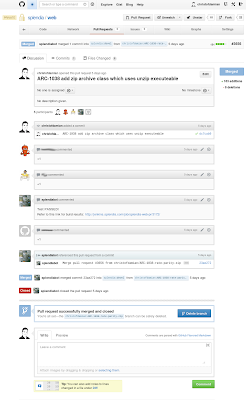This year I managed for the first time to attend Fosdem in Brussels. Since I started to be involved in open source software I always wanted to go, but somehow something else always came up. This time I made an early effort to book my vacation days, hotel and flight.
I stayed at the Bedford Hotel & Congress Center, which was the worst part of the whole trip. Just avoid it.
I never been to Brussels and for some reason thought it would be a bit of a dump with an European Government ghetto attached. But it is quite the opposite, a very charming town with lots of things to do. I checked out the Atomium, House of European History, Veloseum and the Natural History Museum.
There are many statues, parks and gratifies spread around the city to keep you busy.
Most of the time I spend walking around the city and checking out the old buildings and cobblestone streets. I obviously also had fries and waffles.
 Fosdem is a pretty big conference with many parallel tracks. Because it was my first time I took the easiest path and just stayed in the
main room where all the keynotes were happening. Some were more
attended than others, but the room was always pretty full. Here is a
list of the talks I followed, with a link to the official website, some
have the videos already attached.
Fosdem is a pretty big conference with many parallel tracks. Because it was my first time I took the easiest path and just stayed in the
main room where all the keynotes were happening. Some were more
attended than others, but the room was always pretty full. Here is a
list of the talks I followed, with a link to the official website, some
have the videos already attached. FLOSS, the Internet and the Future
https://fosdem.org/2019/schedule/event/floss_internet_future/
Blockchain: The Ethical Considerations
https://fosdem.org/2019/schedule/event/blockchain_ethics/
Very much a high level talk, but presented very well and entertaining.
Mattermost’s Approach to Layered Extensibility in Open Source
https://fosdem.org/2019/schedule/event/mattermost_layered_extensibility/
Mostly a commercial for Mattermost, not much about layering.
Matrix in the French State
What happens when a government adopts open source & open standards for all its internal communication?
https://fosdem.org/2019/schedule/event/matrix_french_state/
I never heard of matrix before, it looks like a very interesting project and it is cool to see it adapted by the French government. I tried it out myself, but it is still pretty buggy - at least the registration process.
Solid: taking back the Web through decentralization
App development as we know it will radically change
https://fosdem.org/2019/schedule/event/solid_web_decentralization/
I read about this on lwn.net . To make this useful in any way it has to be widely adopted, which seems unlikely. Like the semantic web it is a developers dream, that always seems to be in the near future.
The Current and Future Tor Project
Updates from the Tor Project
https://fosdem.org/2019/schedule/event/tor_project/
Very cool to see how Tor is moving and adapting to allow more people to enjoy privacy. Certainly got me to install the Tor Browser on my mobile and thinking about running a Tor node.
Algorithmic Sovereignty and the state of community-driven open source development
Is there a radical interface pedagogy for algorithmic governementality?
https://fosdem.org/2019/schedule/event/algorithmic_sovereignty/
Open Source at DuckDuckGo
Raising the Standard of Trust Online
https://fosdem.org/2019/schedule/event/duckduckgo_open_source/
For me it still has to go a long way before it can replace Google in my daily life. But it is the default in the Tor Browser, so I’ll see how it goes. They also have some additional tools to help with privacy, which looked pretty useful.
Crostini: A Linux Desktop on ChromeOS
https://fosdem.org/2019/schedule/event/crostini/
An infomercial from Google.
Open Source C#, .NET, and Blazor - everywhere PLUS WebAssembly
https://fosdem.org/2019/schedule/event/open_source_microsoft/
I planned to use this slot to get some food, but I am glad I didn’t. Very entertaining talk about the portability of C# code all demoed live with use cases in CLI, Web, micro computer and micro controller. I just still have a deep seated mistrust in Microsoft, so I am not ready to look into C#.
The Cloud is Just Another Sun
https://fosdem.org/2019/schedule/event/cloud_is_another_sun/
I am worried myself of using cloud services like AWS where I am locked in to some software, but some of the services are just so convenient and cheap that it makes sense for a business.
 2019 - Fifty years of Unix and Linux advances
2019 - Fifty years of Unix and Linux advanceshttps://fosdem.org/2019/schedule/event/keynote_fifty_years_unix/
Maddog giving a very long talk about the history of Unix, it made me feel old and young at the same time.


